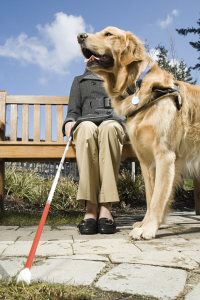 By Kristen Verrastro and Andrew McNaught
By Kristen Verrastro and Andrew McNaught
Recently, a Federal court in Northern California denied Uber Technologies, Inc.’s request to dismiss an access lawsuit. The plaintiffs, National Federation of the Blind of California (“NFBC”) and individual blind members with guide dogs, filed an ADA lawsuit alleging Uber-X drivers committed various forms of discrimination, including refusing to transport blind riders with their service animals.
For example, one blind member of NFBC alleged an Uber-X driver pulled up to the curb; yelled “no dogs;” and then cursed at him before taking off without the NFBC member in the driver’s vehicle. The complaint also alleges that Uber-X drivers have mishandled guide dogs, in one instance even forcing a guide dog into the closed trunk of a sedan before transporting the blind rider. When the blind rider realized where the Uber-X driver placed her dog, she pleaded with the driver, who refused to pull over so the rider could remove the dog from the trunk.
Below, we discuss the arguments considered by the Court regarding Uber’s motion to dismiss. The Court ultimately determined that: (1) the plaintiffs had standing under the ADA; and (2) Uber may be subject to the ADA, potentially as a place of “public accommodation.”
Plaintiffs’ Standing under the ADA
Uber argued that the plaintiffs did not have standing to bring the lawsuit because, among other state law arguments: (1) one plaintiff did not have standing under the ADA’s deterrent effect doctrine; and (2) another plaintiff did not have standing as to the likelihood of future harm under the ADA.
The Court rejected Uber’s arguments. In finding that plaintiffs have standing under the ADA, the Court noted that the plaintiffs shouldn’t have to engage in a “futile” attempt to access services when they: (1) have knowledge that Uber has refused service to passengers with service animals; and (2) believe there is a likelihood such refusals will continue. Specifically, the Court said that “the ADA directs this Court to relax its standard for injury in fact in order to discourage both piecemeal litigation and futile attempts at access” when plaintiffs have actual notice of the alleged discriminatory practice and are in fact deterred from attempting access.
The Court also granted NFBC associational standing to bring suit under the ADA on behalf of its members.
Uber May Be Subject to the ADA
The plaintiffs alleged that Uber is subject to the ADA as either a place of “public accommodation” or, alternatively, as a “specified public transportation service” that also has nondiscrimination obligations. In its motion to dismiss, Uber contended that it is not a place of “public accommodation” covered by the ADA.
Prior to the hearing on Uber’s motion to dismiss, the U.S. Attorney’s Office filed a Statement of Interest in this matter, to clarify the Title III framework under which it believed the Court should consider Uber’s motion. The Government argued that Uber need not be deemed a place of “public accommodation” (42 U.S.C. § 12182) to be liable under Title III because Uber could be independently subject to Title III as a “specified public transportation service” (42 U.S.C. § 12184). The Government indicated that Title III coverage can be premised on either provision, which are not mutually exclusive. The Government stated that “private entities primarily engaged in providing transportation services are covered by § 12184 of Title III, irrespective of whether they are also public accommodations.”
In its Order, the Court indicated that “Uber asserts only that it is not a ‘public accommodation’ under the ADA, but does not ask the Court to dismiss the complaint as to the specified public transportation service claim.” Therefore, the Court did not address whether Uber may be a “specified public transportation service” under § 12184 of Title III.
The Court found that Uber may be a place of “public accommodation” under Title III of the ADA for purposes of surviving a motion to dismiss. Title III of the ADA lists twelve “places of public accommodation,” one of which is a “travel service.” The Court left open the possibility that Uber may fit into this category. Specifically, the Court determined that Uber failed to establish that it should be excluded from the “travel service” category of public accommodations. Finding no clear law to the contrary, the Court required more factual development to determine whether Uber might be considered a place of “public accommodation” under the ADA.
Shifting into Forward Drive
Since the Court denied Uber’s motion to dismiss on all grounds, Uber very recently answered the plaintiffs’ complaint and will now have to defend against these claims. Stay tuned to see how the facts of this important case develop. We will be keenly watching to see whether the Court eventually makes a determination regarding Uber’s status as a place of “public accommodation” under Title III of the ADA, or if the Court speaks to Uber’s potential status as a “specified public transportation service.” If the Court finds Uber is either or both of these, thus subjecting Uber to Title III of the ADA, the decision could have significant impact for all companies in the ride-sharing space.